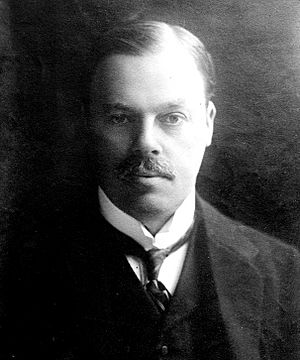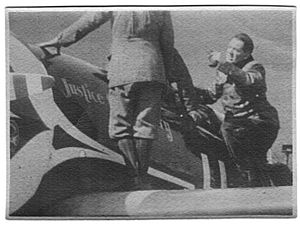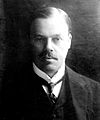Harold Harmsworth, 1st Viscount Rothermere facts for kids
Quick facts for kids
The Viscount Rothermere
|
|
|---|---|

Lord Rothermere
|
|
| President of the Air Council | |
| In office 26 November 1917 – 1918 |
|
| Preceded by | The Viscount Cowdray |
| Succeeded by | The Lord Weir |
| Personal details | |
| Born |
Harold Sidney Harmsworth
26 April 1868 London |
| Died | 26 November 1940 (aged 72) Bermuda |
| Nationality | British |
| Spouse | Mary Lilian Share |
| Children |
|
| Parents |
|
| Relatives |
|
| Occupation | Publisher |
Harold Sidney Harmsworth, 1st Viscount Rothermere, PC (born 26 April 1868 – died 26 November 1940), was a very important British newspaper owner. He owned a company called Associated Newspapers Ltd. He is famous, like his brother Alfred Harmsworth, for creating the Daily Mail and the Daily Mirror newspapers. Rothermere helped make popular journalism what it is today.
Sadly, two of Rothermere's three sons died during the First World War. In the 1930s, he believed in keeping peace between Germany and the United Kingdom. He used his newspapers to share his ideas about avoiding another big war. He passed away in Bermuda early in the Second World War.
Contents
Early Life and Family Background
Harold Harmsworth was born to Alfred and Geraldine Mary Harmsworth. He had several brothers who also became well-known. These included Alfred Harmsworth, 1st Viscount Northcliffe, Cecil Harmsworth, 1st Baron Harmsworth, and Sir Leicester Harmsworth, 1st Baronet.
He went to St Marylebone Grammar School. After school, he worked as a clerk for the Board of Trade. In 1888, he joined his older brother Alfred's newspaper business. By 1894, they bought the Evening News newspaper together.
Building a Newspaper Empire
In 1896, Harold and his brother Alfred started the Daily Mail. Later, they also launched the Daily Mirror. Harold bought the Glasgow Record and Mail in 1910 and the Sunday Pictorial in 1915.
By 1921, he owned several major newspapers. These included the Daily Mirror, Sunday Pictorial, and Evening News. He also shared ownership of Associated Newspapers with his brother Alfred. The Daily Mirror was a huge success, selling three million copies by 1922.
When his older brother died in 1922, Harold took over his share of Associated Newspapers. The next year, he bought the Hulton newspaper group. This made him control many national and local newspapers.
In 1926, Harold sold his magazine business. He then focused on starting newspapers in different cities. In 1928, he created Northcliffe Newspapers Ltd. He planned to open a chain of evening newspapers across the country. This led to a "newspaper war" where different owners competed. By the end of 1929, his newspaper empire included 14 daily and Sunday newspapers.
Today, Rothermere's family still controls the Daily Mail and General Trust.
Public Service and Honors
Harold Harmsworth was given the title of a baronet in 1910. He was later made a peer with the title Baron Rothermere in 1914.
During the First World War, Rothermere served as the President of the Air Council. This was a very important role in the government of David Lloyd George. In 1919, he was given an even higher title, Viscount Rothermere. In 1921, he started the Anti-Waste League. This group aimed to stop what he saw as too much government spending.
In 1930, Rothermere bought the land where the old Bethlem Hospital used to be. He gave this land to the London County Council. It was turned into a public park called Geraldine Mary Harmsworth Park. He named it after his mother and wanted it to benefit the "splendid struggling mothers of Southwark."
Supporting Hungary and Peace Efforts
Rothermere strongly believed that the Treaty of Trianon should be changed. This treaty had taken away large parts of Hungary's land after the First World War. On 21 June 1927, he wrote an article in the Daily Mail called "Hungary's Place in the Sun." In it, he suggested a plan to give back some of Hungary's lost territories. People in Hungary were very thankful for his support. There is even a memorial to Rothermere in Budapest.
In the 1930s, Rothermere used his newspapers to share his views on British politics. He strongly supported the idea of trying to avoid war with Germany. He believed in finding peaceful solutions. He also warned about the growing military power of Germany. He wrote a book in 1939 called My Fight to Rearm Britain, where he argued for Britain to spend more on its defense.
Interest in Aviation
Rothermere was very interested in airplanes. In 1934, he ordered a special plane for himself. He wanted to show how useful commercial aviation could be. This plane, called the Bristol Type 142, was very fast. It could fly at 307 miles per hour, which was faster than any Royal Air Force fighter plane at the time.
Lord Rothermere gave this aircraft, which he named "Britain First," to the country. It was studied to see if it could be used as a bomber. In 1936, a changed version of the plane was made into the Blenheim Mk. I bomber.
Grand Falls, Newfoundland
In 1904, Rothermere and Mayson Beeton traveled to Newfoundland. They were looking for a supply of timber and a place to build a pulp and paper mill. While exploring the Exploits River, they found a place called Grand Falls.
After buying the land, they built a special town for the timber workers. This town grew and is now known as Grand Falls-Windsor.
Family Life
Lord Rothermere married Lilian Share on 4 July 1893. They had three sons. Sadly, their two older sons died during the First World War:
- Captain The Hon. Harold Alfred Vyvyan St George Harmsworth (1894–1918) died from his wounds at age 23. He was awarded the Military Cross a week after his death.
- Lieutenant The Hon. Vere Sidney Tudor Harmsworth (1895–1916) was killed in action at age 21 during the Battle of the Ancre.
- Esmond Harmsworth, 2nd Viscount Rothermere (1898–1978)
Viscountess Rothermere passed away on 16 March 1937.
Images for kids
See also
 In Spanish: Harold Harmsworth para niños
In Spanish: Harold Harmsworth para niños
 | Ernest Everett Just |
 | Mary Jackson |
 | Emmett Chappelle |
 | Marie Maynard Daly |




